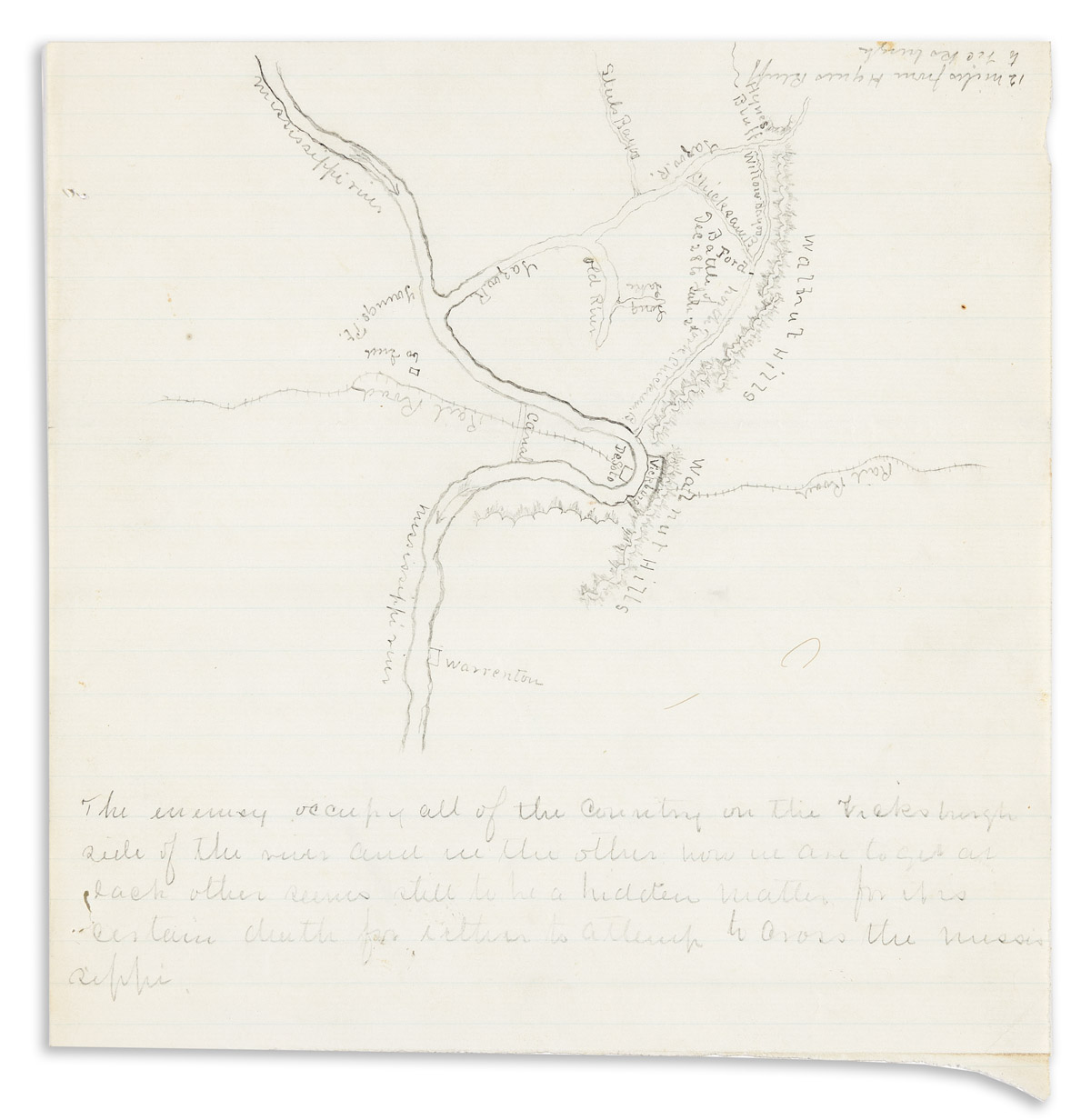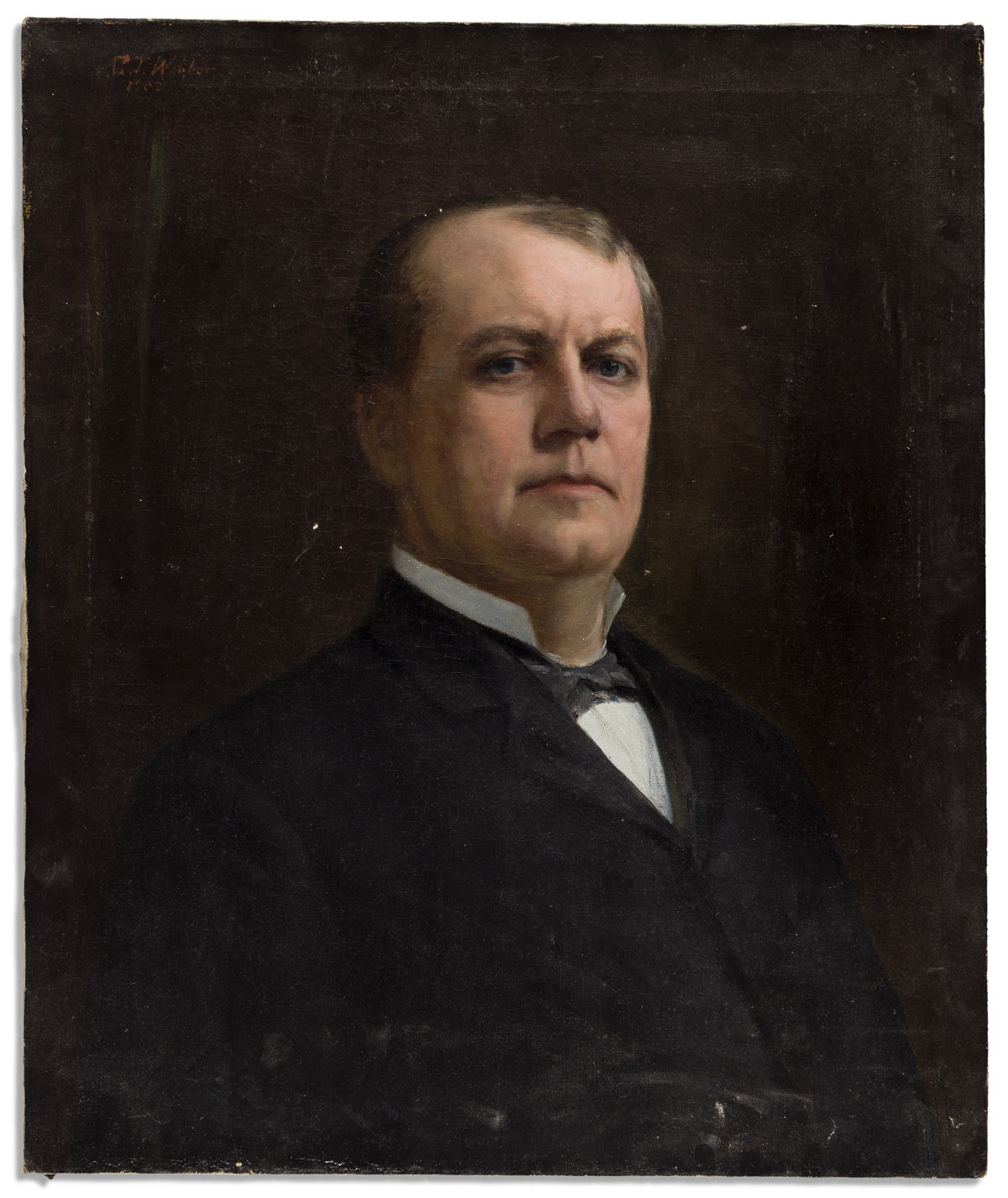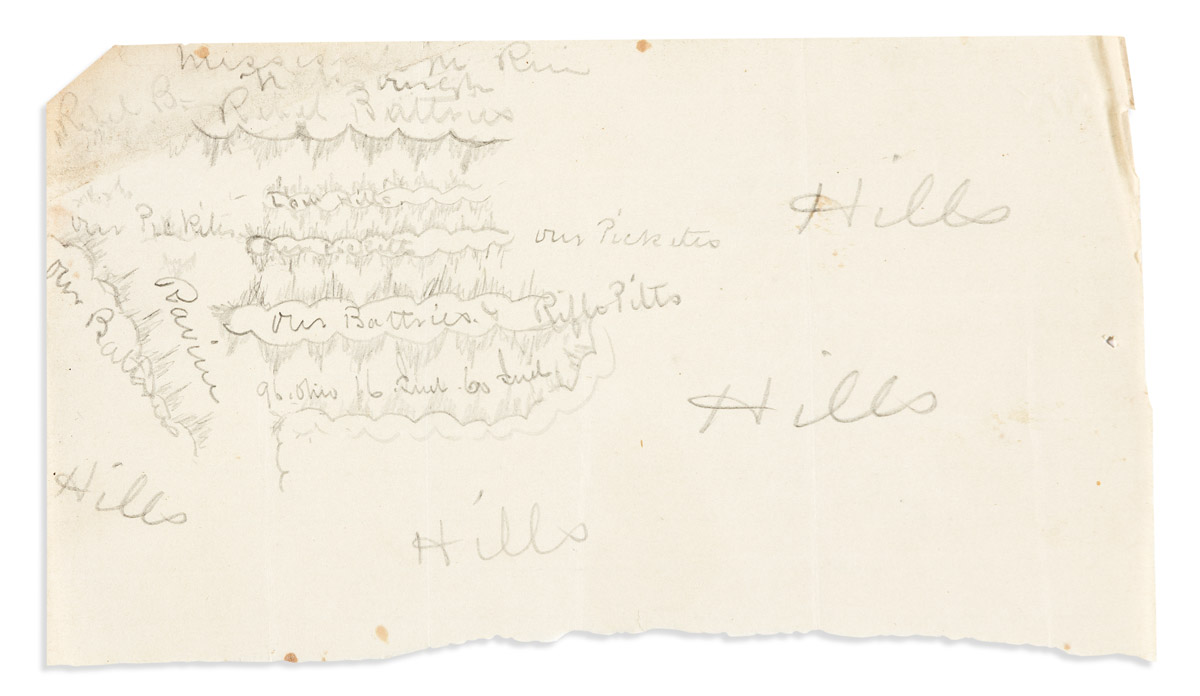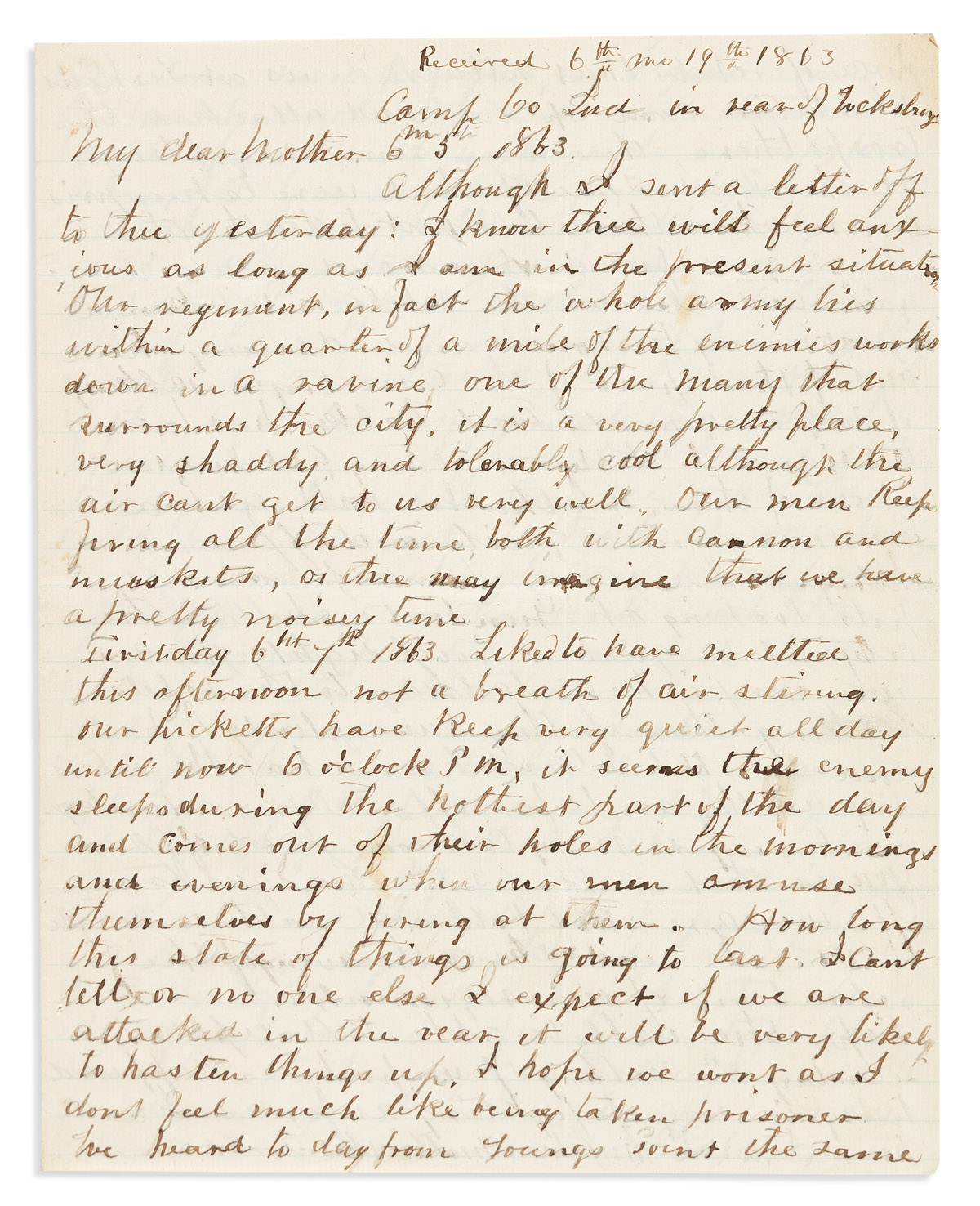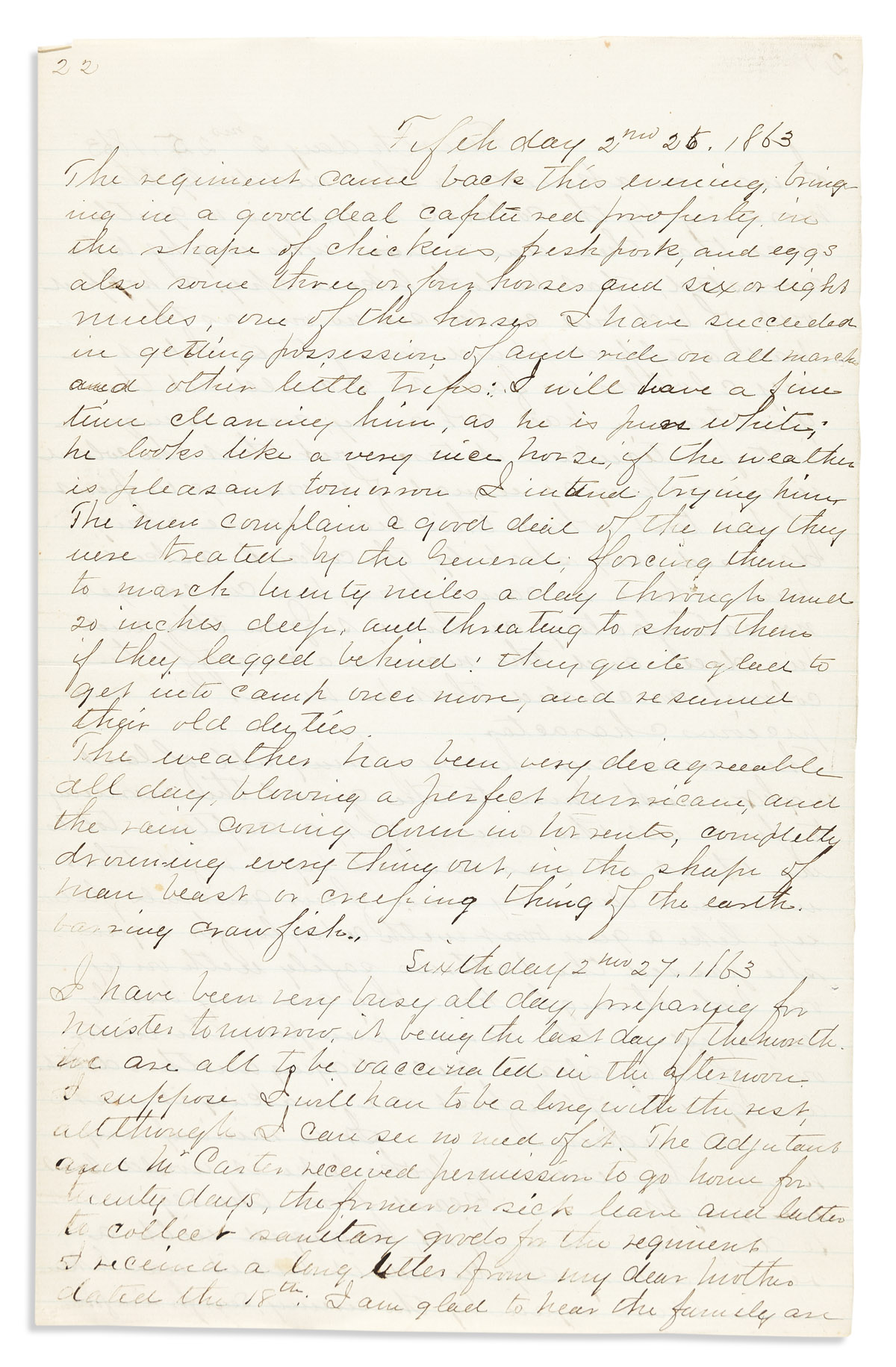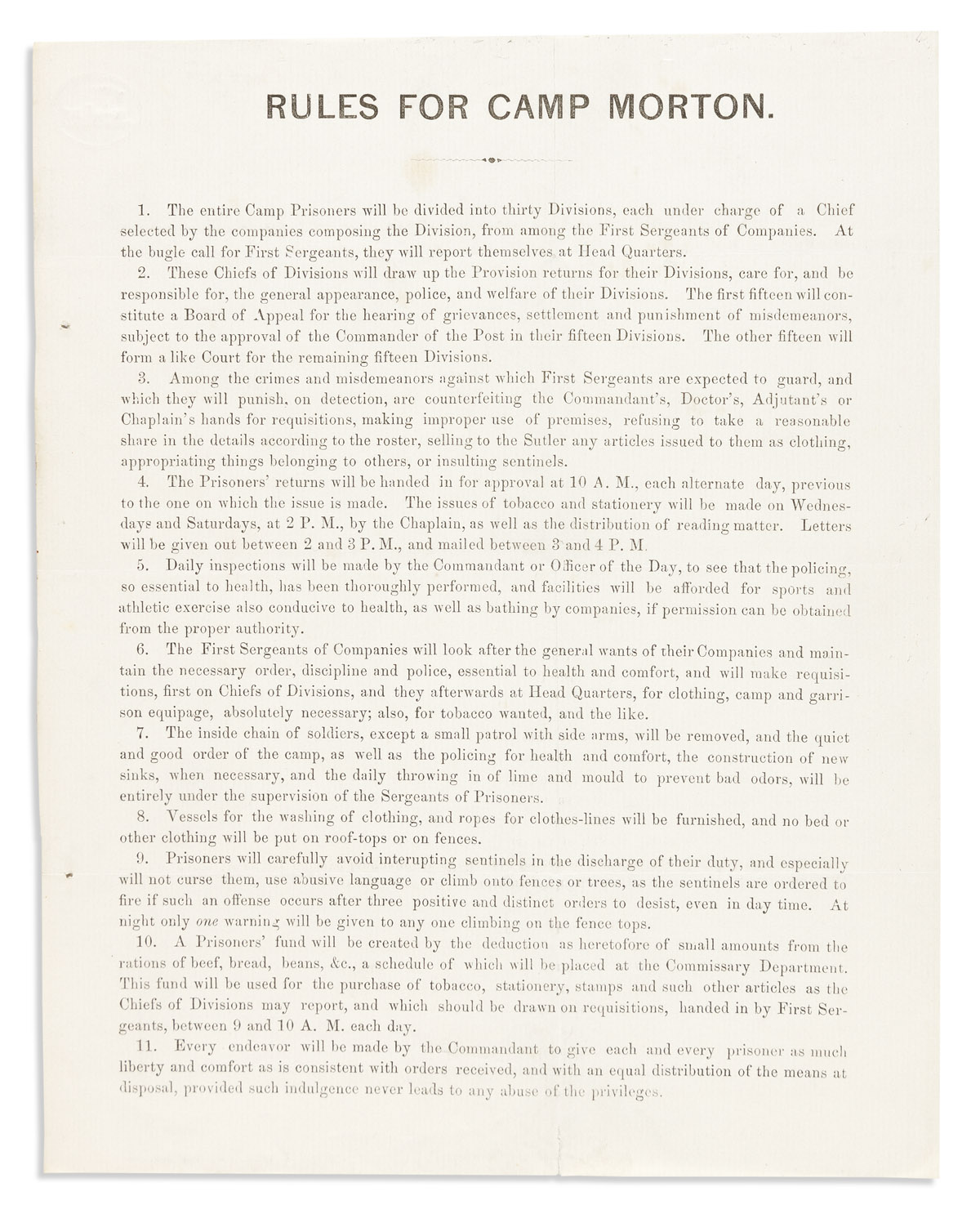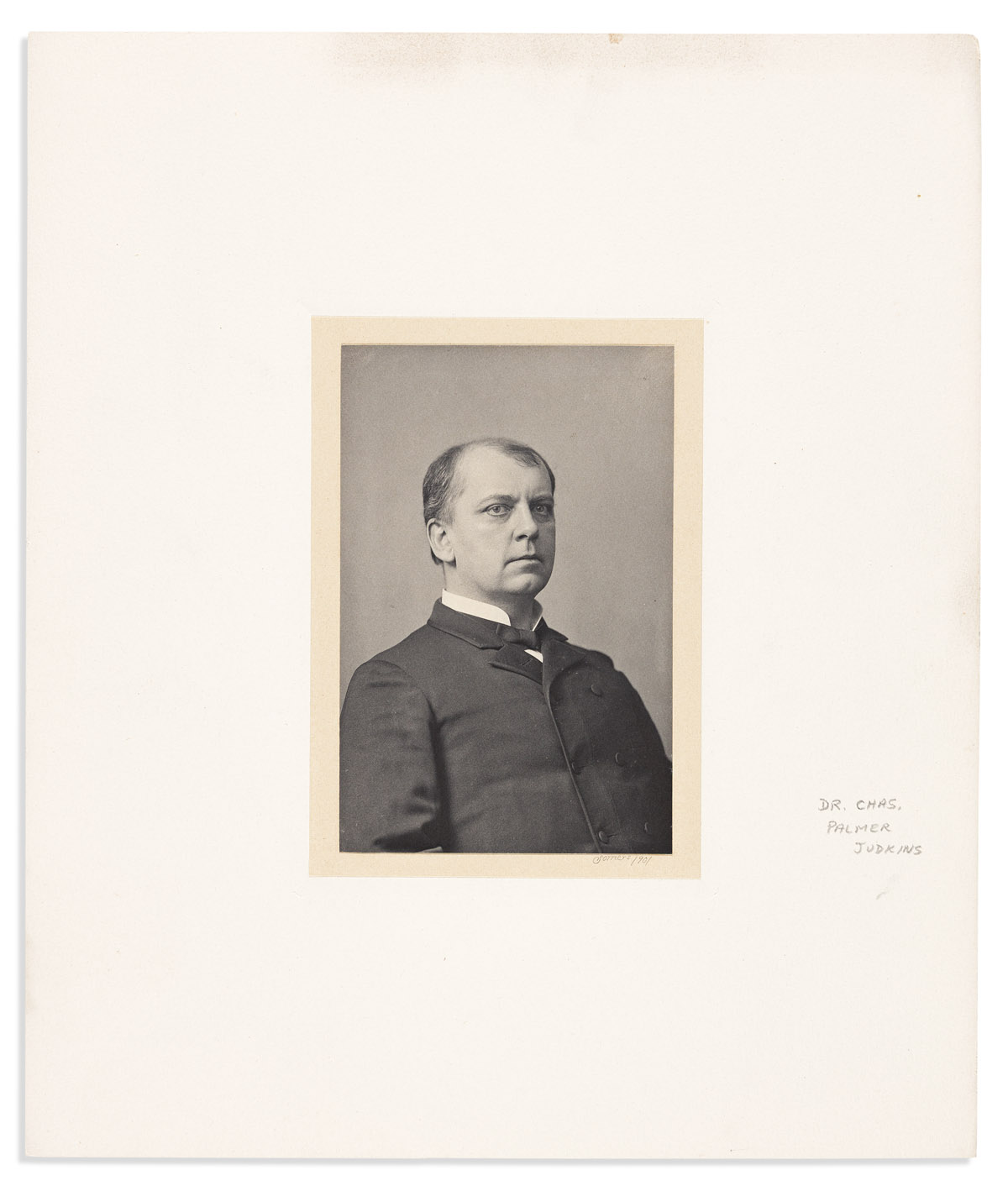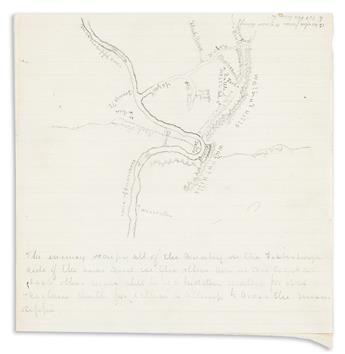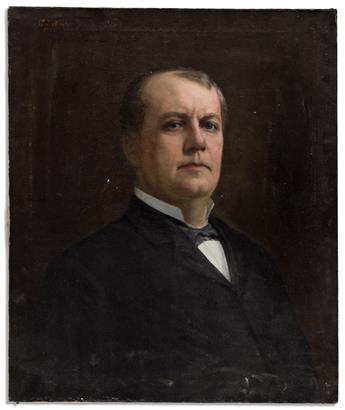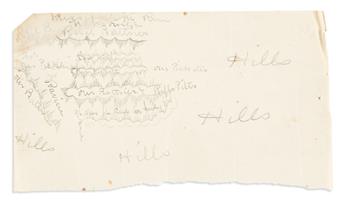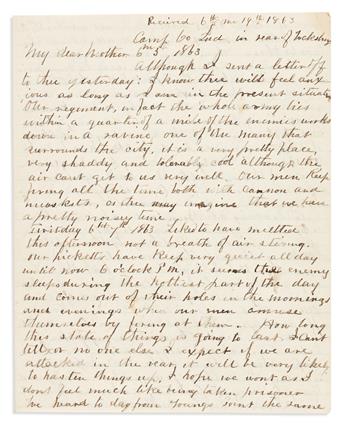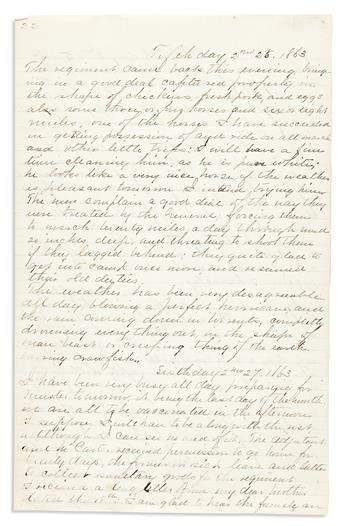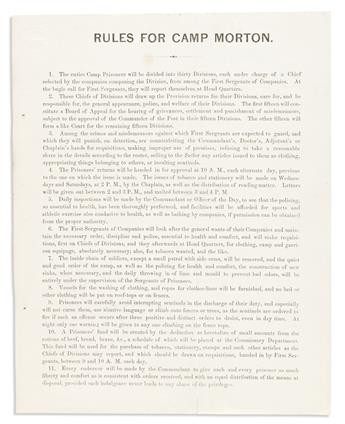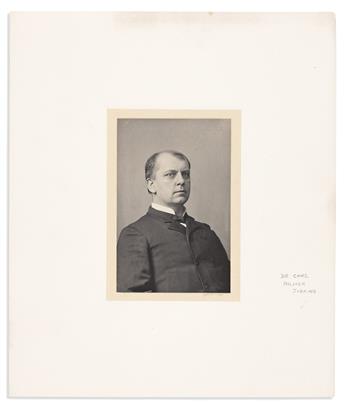Sale 2615 - Lot 75
Price Realized: $ 12,000
Price Realized: $ 15,000
?Final Price Realized includes Buyer’s Premium added to Hammer Price
Estimate: $ 4,000 - $ 6,000
(CIVIL WAR--INDIANA.) Large archive of Lt. Palmer Judkins of the 60th Indiana Volunteers, at Vicksburg and beyond. Approximately 500 items in one box (0.7 linear feet) plus one sleeve, including: 133 wardate Autograph Letters Signed to his mother and other family members, some of them originally written faintly in pencil and over-written in ink at an early date; manuscript diary kept intermittently on [12], 39 loose folio pages and sent home as letters covering 2-3 February 1861, 6-21 May 1862 at Camp Morton, IN; and 9 February to 12 April 1863 at Siege of Vicksburg; 7 company muster rolls, 1862-1863; approximately 300 regimental papers dated 1864-1865 including forage requisitions, returns of ordnance, clothing lists, and more; a 1901 photograph of Judkins, 6 1/2 x 4 1/2 inches on original mount; and a 1902 oil portrait of Judkins mounted on stretchers, signed by C.T. Webber. Various places, bulk 1862-1865
Additional Details
An unusually large and varied Civil War archive, including personal letters, diary entries, regimental papers, ephemera, and a large oil portrait. Charles Palmer Judkins (1842-1900) came from a Quaker family in Cincinnati, OH, and enlisted in the 60th Indiana Infantry in February 1862. In August 1862 he became a quartermaster sergeant, in November a sergeant major, and then in January 1864 a lieutenant and regimental quartermaster. After the war, he was a physician in Cincinnati.
The earliest letters are written from Camp Morton in Indianapolis, where the regiment guarded Confederate prisoners. On 8 March 1862 he describes some of the Confederates who were detailed to work in the regimental offices, one "a lawyer in Frankford Kentuckey and owns half a plantation and Negroes in Georgia, the other is the Flying Dutchman, a celebrated boxer; besides them we have a cook, one who used to be a servant to one rebel officer. He is a very good and quiet man, and I don't think he will poison us. . . . The poor prisoners are dying off very fast, 13 one day, 14 next and so on. It is a great deal harder on the Mississipians than any other." The regiment spent the last half of 1862 in Kentucky.
The regiment's heaviest action was in the Vicksburg Campaign. Judkins did not seem to understand General Sherman's concept of "total war": "We are now on the road to Vicksburg, Miss. . . . We stopped last night at Gaster's Landing. . . . The men destroyed everything by fire except one house. There was a fine dwelling house here unoccupied, which has several small Negro houses around it. One of these took fire and was put out by Mr. Carter our chaplain and myself. . . . I do think that Gen. Sherman is very much to blame for not putting a stop to such acts of incendiary, for it can do no good, and only aggravate the enemy more" (21 and 24 December 1862). He had his first taste of heavy combat at the Battle of Chickasaw Bayou. "I have just returned from an expedition against Vickburgh. . . . five o'clock in the morning when all at once the heavy guns on our left about two miles off opened fire, and if thee ever saw a person get up quick, I did. I thought all the thunder clouds in the heavens had opened on us. . . . The expedition was a failour. . . . We passed an anxious night, all of the regiments gone off the field and ours left to cover the retreat, keep up the camp fires, and make the enemy believe that all the troops were there still" (27 December 1862).
Next came the Battle of Arkansas Post: "The fort we had to take was almost impreginable, in fact if it had not a been for the gunboats they never could have captured it" (14 January 1863). A small diagram of the fort and battlefield is enclosed, showing the location of the gunboats and rifle pits.
Judkins spent months at the Siege of Vicksburg, described in his diary on 25 and 26 February 1863: "There was heavy firing all of last night. . . . It was caused by a raft that was sent down by some of our generals, fitted up like a gunboat, with a big log for a gun. She passed the batteries safely with only one hole through her. . . . The men complain a good deal of the way they were treated by the general, forcing them to march 20 miles a day through mud 20 inches deep, and threatening to shoot them if they lagged behind." An undated letter fragment from early in the siege features a nicely done pencil map of the area, with his note: "The enemy occupy all of the country on the Vicksburgh side of the river, and we the other. How we are to get at eachother seem still to be a hidden matter, for it is certain death for either to attempt to cross the Mississippi."
Judkins added more in a 5 June 1863 letter: "The enemy sleeps during the hottest part of the day, and comes out of their holes in the mornings and evenings when our men amuse themselves by firing at them. . . . We heard today from Youngs Point the same force of Rebels that attacked us at Perkins Plantation came up and attacked the troops there. There were some Negro troops at the point, some of which were taken prisoners, whom the Rebels put to death. The other Negroes found it out, and went in again and cleaned the Rebels out. . . . I have just been up our rifle pits looking at gunboats shelling the city. It is quite a novel sight. You can hear our pickets talking to the rebels, asking them if they have plenty of food and so forth." A small drawing of the rifle pits, batteries, and surrounding hills is enclosed.
Judkins came from a Quaker background. Although that did not stop him from enlisting in the army, he did sometimes call the months by their numbers rather than their pagan names, and favored "thee" over "you"--at least in these family letters. His mother considered visiting his camp at one point, and he responded: "Don't think I would be ashamed of thy plain bonnett anywhere, and most especially here where I am known to be a Friend" (8 March 1862). His family seemed to have mixed emotions about his enlistment. On 3 March 1863 he wrote in his diary "I am glad to find my mother holds the opinion she does in regard to deserting. It relieves my mind of a good deal of anxiety, for I don't know what I might have done if she had so counseled me."
Among the ephemera in the collection, most interesting is an undated printed sheet titled "Rules for Camp Morton." The camp allowed the prisoners to choose their own officers, who were responsible for "policing for health and comfort, the construction of new sinks when necessary, and the daily throwing in of lime and mould to prevent bad odors." None are traced in OCLC or at auction.
Among the very few post-war items in the collection is a large 1902 oil portrait of Judkins painted by prominent Cincinnati artist Charles T. Webber (1825-1911), best known for his 1893 World's Fair painting which dramatized the Underground Railroad.
A massive archive which should be of interest to anyone studying the Siege of Vicksburg, Indiana in the Civil War, or Quakers in the military.
The earliest letters are written from Camp Morton in Indianapolis, where the regiment guarded Confederate prisoners. On 8 March 1862 he describes some of the Confederates who were detailed to work in the regimental offices, one "a lawyer in Frankford Kentuckey and owns half a plantation and Negroes in Georgia, the other is the Flying Dutchman, a celebrated boxer; besides them we have a cook, one who used to be a servant to one rebel officer. He is a very good and quiet man, and I don't think he will poison us. . . . The poor prisoners are dying off very fast, 13 one day, 14 next and so on. It is a great deal harder on the Mississipians than any other." The regiment spent the last half of 1862 in Kentucky.
The regiment's heaviest action was in the Vicksburg Campaign. Judkins did not seem to understand General Sherman's concept of "total war": "We are now on the road to Vicksburg, Miss. . . . We stopped last night at Gaster's Landing. . . . The men destroyed everything by fire except one house. There was a fine dwelling house here unoccupied, which has several small Negro houses around it. One of these took fire and was put out by Mr. Carter our chaplain and myself. . . . I do think that Gen. Sherman is very much to blame for not putting a stop to such acts of incendiary, for it can do no good, and only aggravate the enemy more" (21 and 24 December 1862). He had his first taste of heavy combat at the Battle of Chickasaw Bayou. "I have just returned from an expedition against Vickburgh. . . . five o'clock in the morning when all at once the heavy guns on our left about two miles off opened fire, and if thee ever saw a person get up quick, I did. I thought all the thunder clouds in the heavens had opened on us. . . . The expedition was a failour. . . . We passed an anxious night, all of the regiments gone off the field and ours left to cover the retreat, keep up the camp fires, and make the enemy believe that all the troops were there still" (27 December 1862).
Next came the Battle of Arkansas Post: "The fort we had to take was almost impreginable, in fact if it had not a been for the gunboats they never could have captured it" (14 January 1863). A small diagram of the fort and battlefield is enclosed, showing the location of the gunboats and rifle pits.
Judkins spent months at the Siege of Vicksburg, described in his diary on 25 and 26 February 1863: "There was heavy firing all of last night. . . . It was caused by a raft that was sent down by some of our generals, fitted up like a gunboat, with a big log for a gun. She passed the batteries safely with only one hole through her. . . . The men complain a good deal of the way they were treated by the general, forcing them to march 20 miles a day through mud 20 inches deep, and threatening to shoot them if they lagged behind." An undated letter fragment from early in the siege features a nicely done pencil map of the area, with his note: "The enemy occupy all of the country on the Vicksburgh side of the river, and we the other. How we are to get at eachother seem still to be a hidden matter, for it is certain death for either to attempt to cross the Mississippi."
Judkins added more in a 5 June 1863 letter: "The enemy sleeps during the hottest part of the day, and comes out of their holes in the mornings and evenings when our men amuse themselves by firing at them. . . . We heard today from Youngs Point the same force of Rebels that attacked us at Perkins Plantation came up and attacked the troops there. There were some Negro troops at the point, some of which were taken prisoners, whom the Rebels put to death. The other Negroes found it out, and went in again and cleaned the Rebels out. . . . I have just been up our rifle pits looking at gunboats shelling the city. It is quite a novel sight. You can hear our pickets talking to the rebels, asking them if they have plenty of food and so forth." A small drawing of the rifle pits, batteries, and surrounding hills is enclosed.
Judkins came from a Quaker background. Although that did not stop him from enlisting in the army, he did sometimes call the months by their numbers rather than their pagan names, and favored "thee" over "you"--at least in these family letters. His mother considered visiting his camp at one point, and he responded: "Don't think I would be ashamed of thy plain bonnett anywhere, and most especially here where I am known to be a Friend" (8 March 1862). His family seemed to have mixed emotions about his enlistment. On 3 March 1863 he wrote in his diary "I am glad to find my mother holds the opinion she does in regard to deserting. It relieves my mind of a good deal of anxiety, for I don't know what I might have done if she had so counseled me."
Among the ephemera in the collection, most interesting is an undated printed sheet titled "Rules for Camp Morton." The camp allowed the prisoners to choose their own officers, who were responsible for "policing for health and comfort, the construction of new sinks when necessary, and the daily throwing in of lime and mould to prevent bad odors." None are traced in OCLC or at auction.
Among the very few post-war items in the collection is a large 1902 oil portrait of Judkins painted by prominent Cincinnati artist Charles T. Webber (1825-1911), best known for his 1893 World's Fair painting which dramatized the Underground Railroad.
A massive archive which should be of interest to anyone studying the Siege of Vicksburg, Indiana in the Civil War, or Quakers in the military.
Exhibition Hours
Exhibition Hours
Aliquam vulputate ornare congue. Vestibulum maximus, libero in placerat faucibus, risus nisl molestie massa, ut maximus metus lectus vel lorem.



